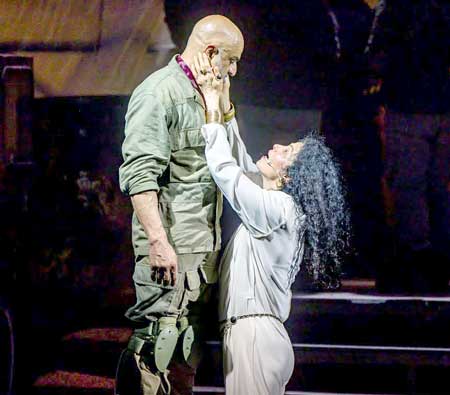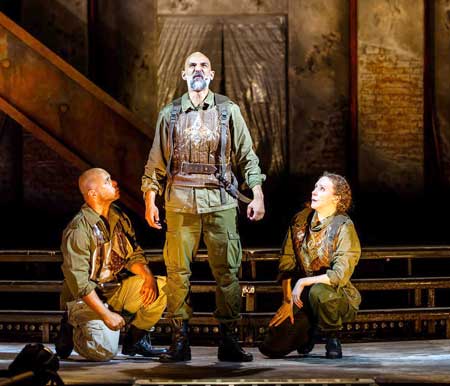Play (1623)
by William Shakespeare
Directed by Steven Maler
Commonwealth Shakespeare Company
Boston Common, Boston, MA
July 19 – August 6, 2023
With Faran Tahir (Macbeth), Joanne Kelly (Lady Macbeth), Marianna Bassham (Malcolm), Jesse Hinson (First Witch/First Murderer/Seyton), Nael Nacer (Macduff), Omar Robinson (Banquo), Joe Penczak (Duncan/Siward), Daniel Rios Jr. (Ross), John Kuntz (Sergeant/Porter/Doctor), Eviva Rose (Young Macduff), Lily Ayotte (Fleance, Third Apparition), Nick Baum (Angus), John Blair (Second Witch, Second Murderer), Elijah Brown (Caithness), Annika Burley (Third Witch, Third Murderer), Alexa Cadete (Menteith, Lord), Jack Greenberg (Donalbain, Young Siward), Jessica Golden (Lady Macduff, First Apparition), Bella Grace Harris (Gentlewoman, Attendant, Second Apparition), Cleveland Nicoll (Lennox), Xander Viera (Messenger, Servant)
Scenic Design: Riw Rakkulchon; Costume Design: Nancy Leary; Lighting Design: Maximo Grano De Oro, Eric Southern; Sound Design: David Remedios; Original Music by/ Assistant Sound Designer: Mackenzie Adamick; Fight Direction: Robert Walsh

Joanne Kelly as Lady Macbeth
in “Macbeth”
Photo: Nile Scott Studios
Courtesy of Commonwealth Shakespeare Company
Having success in battle, Macbeth gets a taste of power and, not satisfied with being just Thane of Cawdor, suddenly wants to be king; his even more ambitious spouse, Lady Macbeth, wants him to get off his duff and make it happen. Serendipitous to this malevolent end, King Duncan soon becomes their overnight guest and Lady Macbeth gives her husband enough of a nudge to kill Duncan while he sleeps. Sociopaths, but not fully-fledged ones who have entirely cemented over their superegos, Macbeth and Lady Macbeth, at first gleeful to ascend to Duncan’s throne, spend the rest of the play getting excoriated by the guilt for what they have done. Ultimately, it does get the best of Lady Macbeth – Out, out, damn spot is the least of it – but Macbeth fights back, and despite the perplexing forecast by the three fortune-telling witches who deliver forecasts at the beginning of the play and enter episodically to provide updates, the end is not good for him either, though, as one can well imagine, much better for Scotland.
The many great and memorable lines come in rapid succession and it is truly a pleasure to find them framed dramatically and forcefully on a hot summer night in the Boston Common, care of the devoted and durable Commonwealth Shakespeare Company which has been dutifully and energetically mounting productions there for the past twenty-seven years.
Steven Maler, the tireless and inspired founder and artistic director of the company, also directed this production – as he does many of the CSC productions – and which, with considerable smoke, a chorus of battle cries, and a full menu of sword-fighting, also features some wonderful acting. It’s done in the open air, with the staged melee and the Shakespearean macrame of phrasing traveling through the trees and mixing with the enveloping traffic, sirens and the general aural to-do of city life, making for an enveloping urban reflection on the perils of power.
And, of course, the selection of the play Macbeth by CSC in the midst of the current political climate – domestically and abroad – is surely no mistake. While the meteorologic storms hover and fires rage due to global warming, political storms and their attendant insurgencies of ego and malevolence abound everywhere, making the current production that much more imposing and, for better or worse, worryingly relevant.

Nael Nacer as Macduff
Marianna Bassham as Malcolm
in “Macbeth”
Photo: Nile Scott Studios
Courtesy of Commonwealth Shakespeare Company
Among the various theatrical rubies in this robust production is the quite long interchange between Boston thespian gems Marianna Bassham as Malcolm – in this production cast as a woman – and Nael Nacer as Macduff, in Act 4 in the second half. In a revealing and condensed series of lines, Malcolm offers a rapid existential survey of the perils of grandiosity, exhibits its temptations, reviews it thoughtfully, and then withdraws from it. It’s as though her conscience is gestating, forming and birthing in the span of a single scene; it’s revealing, intense, and a quite remarkable abbreviation of perilous relationship between power and statesperson-ship. Throughout the interchange, Macduff anchors the serious moral line and holds the feet of Malcolm – who sits on deck as the rightful heir to the throne – to the fire of thoughtful reflection. Of course, in the end, Malcolm becomes the great savior of Scotland and represents that moral accession in a vivid way. But this scene is telling and interesting for its quite rapid exchange of moral conundrums; how fortunate are we, and the production, to have two of Boston’s premier actors, Marianna Bassham and Nael Nacer carry it off and have a production which frames it so nicely. In a way, it’s the heart and ethical core of the play and this production, and these great actors, embody it estimably.
Mr. and Mrs. Macbeth are played decently by Faran Tahir and Joanne Kelly, though – perhaps it’s because of the script cuts that were made to provide a manageable evening for the greater public of Boston – some of that anguish seems a bit truncated. The great lesson of Macbeth is that guilt has no bounds, and though we get a sense of that here, it feels like a lightened version of anguish – abbreviated and not completely overwrought. The lead actors are passionate and give us the basic idea, though the expected catharsis floats more than dives.
There is an interesting, and I wouldn’t say entirely felicitous, interpretation of the scene between Lady Macduff and her son (here played Eviva Rose, a young girl) before they are carried to their destinies by Macbeth’s cadre. It’s a wittily and wryly written scene, but hovers dangerously on the edge of pantomime; to be effective, its offhandedness has to embody a sense of foreboding in every line. Here it’s a bit too playful and seems to not carry that shadowy anticipation, seeming particularly out of place when the cadre arrives.
The fight scene between Macbeth and Macduff is pretty elongated and choreographed in a way that makes it a bit more like shadow boxing than a duel to the death, though, here too, we get the idea; and, indeed, it is pretty grim when Macduff comes from below with a shish-kebab of Macbeth’s head. It’s a terrific idea to have cast Faran Tahir as Macbeth and Nael Nacer as Macduff – they look quite alike, have similarly cropped coifs and, in their visual and temperamental parallelism, form a great polar duo. Interestingly, Nacer understudies for Tahir in the title role.
In the performance I attended John Kuntz plays the funny part of the Porter (alternating with Fred Sullivan, Jr), and he does a terrific job, making the hilarity palpable and an infectiously satisfying part of the production. The clown parts have really done well in some of these CSC on The Common productions. Debra Wise stole the show last summer in her rendition of Dogberry in Much Ado About Nothing.
Definitely go see it. Despite its grim but relevant subject it is lively and has some fun moments, it’s in the open air, it’s free, and there some great actors and some great acting. Screens with projected text are positioned so one can see the words as well as hear them, which helps with the unpredictable urban soundscape, as well as with the frequently knotty Shakespearean language.
– BADMan (aka Charles Munitz)
Leave a Reply